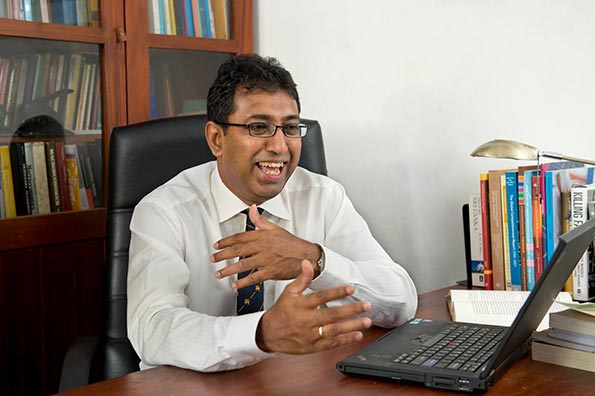Sri Lanka will not be flooded by Indians – Harsha

Officials in Sri Lanka have described as “premature” the controversy currently raging in the island over the Lankan government’s intention to sign an Economic and Technical Cooperation Agreement (ETCA) with India.
“As yet, there is no document to comment on. What was exchanged between the Commerce Secretaries of the two countries was a one-page document containing eight points on economic and technical cooperation expressed in general terms. It is still an internal document subject to negotiations. In the absence of details, any controversy over ETCA is premature,” Express was told.
But both sides are working separately on details. What the Lankan Minister of Development Strategies and International Trade, Malik Samarawickrama, intends to release on Tuesday, is a document on what Lanka expects from the ETCA. The Indian side is yet to release a detailed document containing its perspective. But the two countries are aiming at signing a preliminary “framework” agreement in June.
The Lankan Deputy Minister of Foreign Affairs, Harsha de Silva, told Express that while there is no formal document yet, some issues which had plagued the India-Lanka Free Trade Agreement (ISLFTA) are expected to be addressed in the ETCA. Among these are the Non-Tariff Barriers in India; the need for an agreement on Mutual Recognition of Standards; and the need to lift restrictions on ports of entry.
De Silva said that the Lankan government will have consultations with local stakeholders before finalizing a draft ETCA. Earlier, he told the media that the opening up of the services sector will not result in Lanka being flooded by Indian professionals because Lanka will not be going in for Mode 4 of the General Agreement on Trade in Services which allows movement of “natural persons”. Entry will be allowed only in IT and ship building.
According to Prof.Rohan Samarajiva of the think tank LIRNEasia, even the much maligned Comprehensive Economic Partnership Agreement (CEPA) had restricted Indian personnel to Indian funded firms. He also points out that India had shown flexibility in response to Lankan demands when it hiked the quota for apparels under ISLFTA, and recognized Colombo as the regional transport hub under CEPA, and that, at the cost of Indian ports, Indian Express reports.
Latest Headlines in Sri Lanka
- Sri Lanka and United States discuss Economic Support and Reforms April 19, 2024
- Israeli missile strikes Iran amid escalating Middle East tensions April 19, 2024
- President says he will build a Sri Lanka that the youth aspire to April 19, 2024
- NPP presents 7-point pledge on Easter Sunday Attack to Cardinal Ranjith April 18, 2024
- Dialog Axiata to acquire Bharti Airtel’s telecom operations in Sri Lanka April 18, 2024



when and if doctors are to come there should be a regulation that all of them strictly go through a 1 year internship here otherwise you will get a lot of quacks coming here,
Well Dr Harsha,
Thank you for your assurance which is not worth the value of the paper on which is written.
We all know today you are a ‘paper’ hero and tomorrow, you will be a not a ‘paper zero’ but a real zero.
The Indians are yearning to colonise Sri Lanka.
Did you read of the proposed tunnel under the ocean to provide bus transport to the Indians who are hoping to arrive here?
Well, isn’t that an indicator of India’s aspirations?
Not only the IT industry, they will dominate the hospitality industry consisting hotels and brothels.
Also, Indians are crazy over coconuts; they will take over and rape every coconut tree and carry its wealth back to India.
Engineer P Maheswaran,
Some times your writings sound as if you are a nut case! From where did you get your engineering degree, Timbuktoo I suppose. Indians raping our coconut trees, some weird imagination! They have coconuts all around their coast which is longer than ours.
What does this technical cooperation amount to. As is most of the technology is freely available the real problem is we are not able to overcome the constraints preventing the transfer of the technologies in the development process. As is we are dependent on the import of evrything from a pin and beyond.
Various industrial coporations were set up by the government in the sixties they failed because the goverment failed to block the import of things manufactured in these corporations. One I could think of the fertiliser corporation eventually it shut down and the machinery was sold.
If technical cooperation means setting up industries in Sri Lanka they have the advantage of having control of the raw materials and the markets.
If the the TC coporation be effective the government ought to formulate a polic, policy dependent on the resources and its management identify the areas of investment, and its impact on our ecosystem.
The areas of investment should not be left at the the discretion of the investors whether they be Asutrians, Germans, Indians or the Chinese!